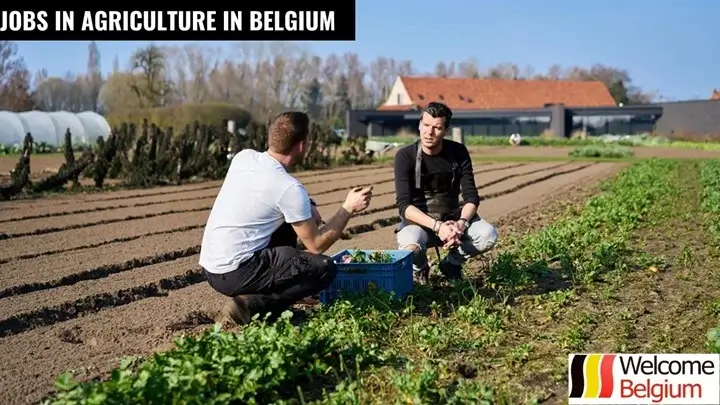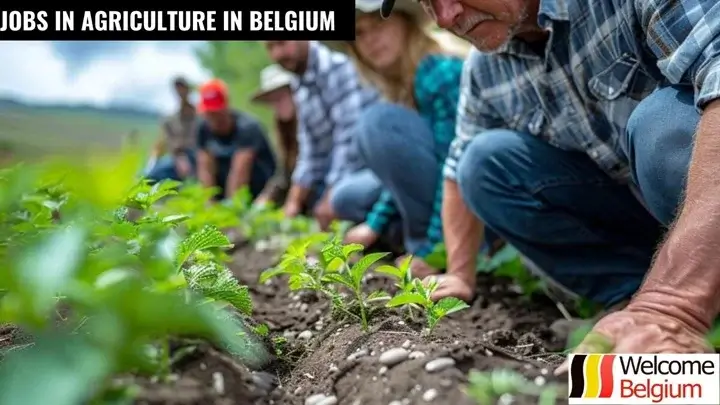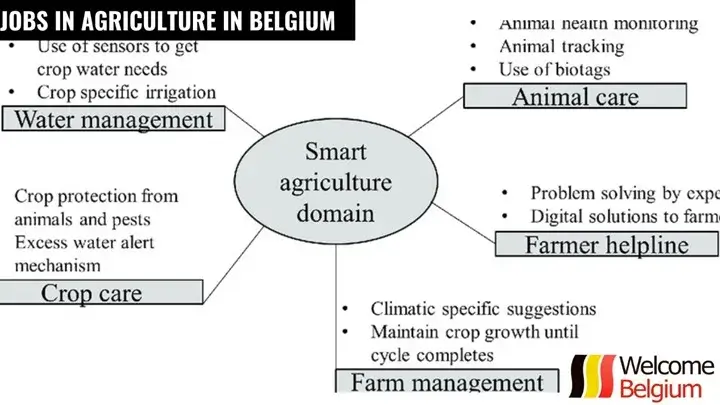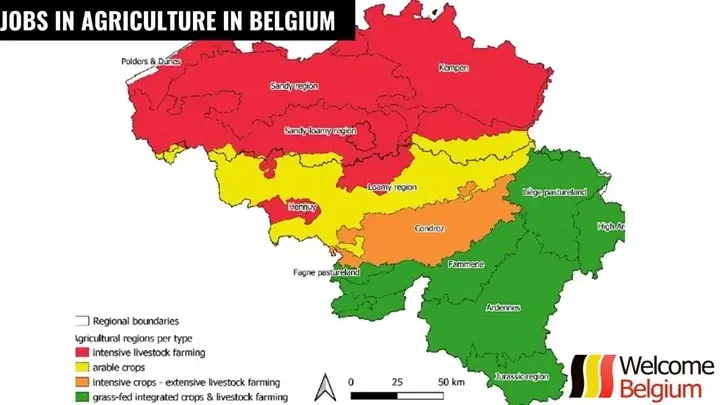Agriculture in Belgium is a sector where labor is always in demand. Agricultural jobs in Belgium offer both temporary and permanent positions and offer good opportunities for those who are prepared for active physical labor. Thanks to the country’s rich agricultural diversity, available jobs, and demand for foreign labor, thousands of people choose to work on Belgium’s farms and fields every year.
Peculiarities of the agricultural sector in Belgium
Belgium’s agriculture is diverse and highly adaptable to its climate and culture. Belgium’s climate, with its moderate temperatures and stable rainfall, allows for the efficient cultivation of a variety of crops, which attracts foreign workers and creates jobs in Belgium’s agriculture. The country’s agricultural culture preserves centuries-old traditions, while modern technologies are being actively introduced into the sector, increasing productivity and opening up new vacancies for specialists.
The main specializations of the agricultural sector in Belgium are:
- Vegetable growing – growing potatoes, cabbage, carrots and other popular vegetables.
- Horticulture – cultivation of apples, pears, berries, especially in the regions of Limburg and Haspengouw.
- Dairy farming – production of milk, butter and cheese with high export potential.
- Cereals – wheat, barley, oats, especially in Wallonia.
- Floriculture – growing of ornamental plants, mainly in the Bruges and Antwerp regions.
These specializations not only form the basis of the agricultural sector, but also provide employment for both locals and foreign workers. In the future, jobs in Belgian agriculture are likely to expand thanks to sustainable development and the introduction of technology. The sector remains attractive and promising for those who are prepared for physical work in the open air.
Advice:
Before searching for vacancies, study the specifics of the region and the in-demand crops to choose the right direction.
Types of jobs in agriculture
Belgium’s agricultural jobs cover a variety of specializations, each requiring specific skills and training. The agricultural sector includes both basic farm work and more specialized positions that require specific experience. These jobs offer a chance to get to know the country’s agricultural culture and offer employment throughout the year.
Agricultural professions of countries:
- Seasonal work involving the picking of fruits, vegetables, and other crops. This type of employment is suitable for people with good physical stamina and a willingness to work hard.
- Greenhouse worker. Working in greenhouses involves caring for, planting, and harvesting plants. This type of employment requires accuracy and knowledge of the basics of working with agricultural crops.
- Animal Care Worker. Involves caring for farm animals, feeding, health care, and cleaning. This job often requires full-time employment.
- Tractor driver and operator of agricultural machinery. Simplifies and speeds up land cultivation, sowing and harvesting. The job requires skills in driving specialized machinery and responsibility.
- Engaged in planning and managing agricultural processes on the farm. This position requires specialized education and work experience.
- Quality Control Lab Technician: Tests products to ensure they meet quality standards, often working on large farms or agricultural enterprises. Involves both field research and lab work.
- Agricultural produce packer. Involves packing, sorting and labeling agricultural produce. Suitable for people with high attention to detail and willingness to work on a conveyor belt.
Agriculture in Belgium offers promising opportunities for both beginners and experts. Choosing a job in this field will help you gain valuable skills and the security of stable employment.
Advice:
Pay attention to seasonal vacancies, as they are especially popular among employers.
Seasonal and permanent jobs, what is the difference
Seasonal and permanent jobs in agriculture in Belgium differ in terms of employment, duration and requirements. Seasonal jobs tend to focus on specific stages of the agricultural cycle, such as sowing or harvesting, and involve temporary workers for a period of weeks or months. These positions are often filled by students, tourists and those looking for short-term work.
Permanent jobs, on the other hand, involve long-term employment with more stable duties, such as caring for animals, operating equipment, or quality control. These positions require more skill and often include benefits and a higher level of responsibility.
Belgium’s agricultural jobs can offer a variety of employment options, depending on the employer’s needs and the applicant’s qualifications. Tip: For more confidence in finding a job, check out popular seasonal and permanent positions.
Salary Level Analysis
This section provides an analysis of salaries for different agricultural jobs in Belgium, taking into account differences between natives and immigrants. Agricultural jobs in Belgium cover a wide range of occupations, and salary levels can vary significantly depending on specialization and experience.
| Profession | Salary (locals) | Salary (immigrants) |
| Farmer | €30,000 – €50,000 | €25,000 – €45,000 |
| Gardener | €25,000 – €40,000 | €22,000 – €35,000 |
| Worker at harvest | €20,000 – €30,000 | €18,000 – €28,000 |
| Vet | €45,000 – €70,000 | €40,000 – €65,000 |
| Agronomist | €35,000 – €60,000 | €30,000 – €55,000 |
| Agronomist | €40,000 – €65,000 | €35,000 – €60,000 |
| Livestock farm worker | €22,000 – €35,000 | €20,000 – €30,000 |
As the table shows, agricultural salaries vary not only by profession, but also between natives and immigrants. Belgian agricultural jobs offer a variety of opportunities, but immigrants often face economic barriers and lower starting salaries.
For immigrants looking to improve their financial situation, it is important to understand current salary trends. To improve their chances of getting high-paying jobs in Belgium’s agriculture sector, immigrants should consider upgrading their skills and learning the language.
Advice:
To improve their chances of getting high-paying jobs in Belgium’s agriculture sector, immigrants should consider upgrading their skills and learning the language.
Requirements for applicants
Working in the agricultural sector in Belgium offers many opportunities for job seekers, especially in light of the growing demand for locally produced products. However, before you start looking, it is important to understand the basic requirements that are placed on candidates. These include both legal aspects and professional skills that can significantly affect the success of employment. Understanding these criteria will help job seekers adapt to market demands and increase their chances of getting the desired position.
For job seekers in agriculture in Belgium, there are several key requirements that are important to consider:
- Work permit. Foreign nationals must have a valid work permit to work legally in Belgium. This requirement applies to both seasonal and permanent positions.
- Health certificate. Some professions, especially those related to livestock farming and food processing, may require a health certificate confirming the absence of infectious diseases and compliance with sanitary standards.
- Work experience: Having experience in agriculture or related fields such as horticulture or agronomy is often an important factor when applying for a job.
- Knowledge: Basic knowledge of agronomic principles, agricultural technology, and plant or animal care can improve your chances of getting a job.
- Physical Stamina: Working in agriculture can be physically demanding, so applicants must be prepared to perform strenuous physical tasks.
- Language skills: Knowledge of local languages (Dutch, French or German) may be required to successfully communicate in the workplace and follow instructions.
- Outdoor Ability: Being able to work in a variety of weather conditions and outdoors is important for many agricultural jobs.
Each of these requirements plays a significant role in the recruitment process. Applicants should carefully research job openings and requirements to prepare themselves and increase their chances of success. It is also important to stay up-to-date with changes in legislation and employee requirements. Tip: Before applying for a job in agriculture in Belgium, be sure to familiarize yourself with the latest legal and professional requirements to avoid any unpleasant surprises in the future.
Advice:
Before applying for a job in agriculture in Belgium, be sure to familiarise yourself with the latest legal and professional requirements.
Popular agricultural regions
Belgium offers agricultural jobs concentrated in specific regions of the country, each with its own type of agricultural activity. Depending on the season and type of work, Belgium’s popular agricultural regions attract workers with different skills and interests. Employment options here can be short-term or permanent, making these positions accessible to foreign workers and locals.
Description of agricultural regions of Belgium:
- Flanders is the northern part of Belgium, which is famous for dairy farming and vegetable production. Local farmers often hire seasonal workers to pick vegetables and care for animals.
- Wallonia: A region in the south of the country known for its wine and cereal production. Jobs include grape picking, driving farm machinery, and permanent positions in agricultural production.
- Limburg: This region is located in the east of Belgium and is characterized by a developed horticulture industry, especially the cultivation of fruits such as apples and pears. Seasonal work here includes harvesting and sorting the fruit.
- Antwerp: Although it is an industrial region, its outskirts are home to farms specializing in crop and livestock farming. Here you can find jobs in plant care and soil work.
- West Flanders: A region that is heavily involved in vegetable and potato production. Jobs here may include harvesting and packaging crops.
Belgian agricultural jobs offer a variety of opportunities for those looking for seasonal or permanent employment. Each region of the country offers unique conditions and specializes in certain agricultural areas, be it viticulture, horticulture or dairy farming. The choice of a specific region and type of vacancy depends on the worker’s qualifications and interests. For foreign specialists and seasonal workers, Belgian agriculture can become an accessible and stable source of income with the possibility of long-term cooperation.
Advice:
Before you start working, check out the seasonal peaks to increase your chances of landing a successful job.
Prospects and development of agriculture in Belgium by 2025
Belgium’s agriculture sector continues to evolve, with significant changes expected by 2025 to improve the sector’s efficiency and make it more attractive to workers. The introduction of automation technologies and smart control systems will help to optimise production, improving yields and reducing costs. One of the main areas will be strengthening resilience to climate change, with farmers investing in innovations to reduce the impact of drought and rising temperatures.
Development prospects include:
- Automation of processes: from robotic harvesting to smart water management systems and soil cultivation.
- Development of organic agriculture: Demand for organic products is expected to increase, which will encourage farmers to switch to environmentally friendly production methods.
- Innovative approaches to crop cultivation: the introduction of greenhouses and vertical farms to increase yields and use small plots of land.
- Improving working conditions and wages: adapting legislation to modern labor market requirements to attract and retain qualified specialists.
- Reducing carbon footprint: introducing sustainable practices and reducing the use of chemical fertilizers, which contributes to the transition to a green economy.
The job outlook in Belgium’s agriculture sector is driven by the industry’s continued growth and development, offering foreign workers more opportunities for stable income and professional advancement.
Advice:
In the coming years, skills in working with automated systems and sustainable agricultural technologies will be particularly in demand.








